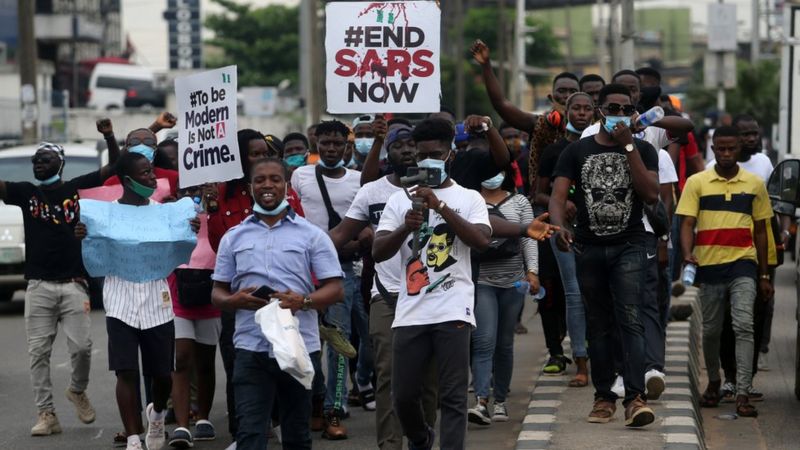
#EndSars: How Nigeria’s anti-police brutality protests went global
#EndSars Nigerians have been protesting for years against police brutality, so why did this October’s protests gain international attention and support at a scale never seen before?
Over the last two weeks, an outpouring of support for Nigerian protesters has played out on Twitter, with various hashtags, but predominantly #EndSARS.
Sars stands for the Special Anti-Robbery Squad.
Accusations of Sars officers robbing, attacking and even killing people go back years but a new wave of protest started at the beginning of October.
The Tweeter, who calls himself Chinyelugo, told the BBC that he normally keeps a low profile on Twitter but that he personally had been harassed by the police previously so when a friend told him about what appeared to be another attack by police he felt the need to tweet it.
“If Sars see you as a young person who is successful with a nice car, they will harass you and extort money from you,” he explained.
He later tweeted video of what he said was the young man shot by police.
The video appeared to be from an Instagram stories post by an account by someone who describes themselves as Azakaza Sarah – a brand ambassador.
Her posts are normally a mixture of posing in fishnet tights and promoting body scrubs.
It’s possible that this video had already passed from the person who filmed it, through many different people, and WhatsApp groups before it reached Azakaza Sarah.
A few people who the Nigerian press described as social media influencers, and later described themselves as “accidental leaders” took up the cause.
The BBC’s Nduka Orjinmo says the real energy was injected on Wednesday 7 October, four days after the tweet about the man being shot, when Rinu Oduala, a woman who describes herself as a media strategist, persuaded other protesters to spend the night outside government house in Lagos.
In the early days of the protests BBC Nigeria correspondent Mayeni Jones observed an interesting digital protest which could explain why this protest got so much more attention than previously.
Read Also – Mahmood Ahmadu: The Man Forbes Best of Africa Cap Fits
The organisers appeared to be attempting to shame brands and journalists by tagging their twitter handles in tweets and asking them why they weren’t covering the protests.
Here’s one directed at broadcaster DSTV.
Source – https://www.bbc.co.uk/